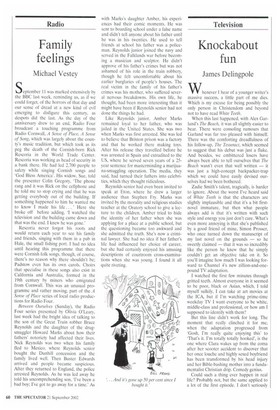Family feelings
Michael Vestey
September 11 was marked extensively by the BBC last week, reminding us, as if we could forget, of the horrors of that day and our sense of dread at a new kind of evil emerging to disfigure this century, as despots did the last. As the day of the anniversary drew to an end, Radio Four broadcast a touching programme from Radio Cornwall, A Sense of Place, A Sense of Song, which was largely about the county's music tradition, but which took as its peg the death of the Cornish-born Rick Rescoria in the World Trade Center. Rescoria was working as head of security in a bank there. He had led 2,700 people to safety while singing Cornish songs and 'God Bless America'. His widow, Sue, told the presenter Colin Gregory, 'The phone rang and it was Rick on the cellphone and he told me to stop crying and that he was getting everybody out of the building. If something happened to him he wanted me to know I made his life .. . ' Here she broke off before adding, 'I watched the television and the building came down and that was the end. I knew he was gone.'
Rescoria never forgot his roots and would return each year to see his family and friends, singing with them in a pub in Hale, the small fishing port. I had no idea until hearing this programme that there were Cornish folk songs, though, of course, there's no reason why there shouldn't be; Padstow even has its own carols. Choirs that specialise in these songs also exist in California and Australia, formed in the 19th century by miners who emigrated from Cornwall. This was an unusual programme and rather moving, part of the A Sense of Place series of local radio productions for Radio Four.
Between Ourselves (Sunday), the Radio Four series presented by Olivia O'Leary, last week had the bright idea of talking to the son of the Great Train robber Bruce Reynolds and the daughter of the drugsmuggler Howard Marks about how their fathers' notoriety had affected their lives. Nick Reynolds was two when his family fled to Mexico. where Reynolds senior bought the Dunhill concession and the family lived well. Then Buster Edwards arrived and people became suspicious. After they returned to England, the police arrested Reynolds. As he was led away he told his uncomprehending son, 'I've been a bad boy; I've got to go away for a time.' As with Marks's daughter Amber, his experiences had their comic moments. He was sent to boarding school under a false name and didn't tell anyone about his father until he was in his twenties. He used to tell friends at school his father was a policeman. Reynolds junior joined the navy and served in the Falklands war before becoming a musician and sculptor. He didn't approve of his father's crimes but was not ashamed of his role in the train robbery, though he felt uncomfortable about his earlier burglaries of people's houses. The real victim in the family of his father's crimes was his mother, who suffered several nervous breakdowns. His own life, he thought, had been more interesting than it might have been if Reynolds senior had not done the things he had.
Like Reynolds junior, Amber Marks remained loyal to her father, who was jailed in the United States. She was two when Marks was first arrested. She was led to believe that Brixton prison was a factory and that he worked there making toys. After his release they travelled before he was arrested in Spain and extradited to the US, where he served seven years of a 25year sentence for masterminding a marijuana-smuggling operation. The media, they said, had turned their fathers into celebrities, which they thought ridiculous.
Reynolds senior had even been invited to speak at Eton, where he drew a larger audience than Stephen Fry. Marks was invited by the morality and religious studies teacher at the Oratory school to give a lecture to the children. Amber tried to hide the identity of her father when she was applying for a place at a public school, but the questioning became too awkward and she admitted the truth. She's now a criminal lawyer. She had no idea if her father's life had influenced her choice of career, but she had certainly enjoyed his amusing descriptions of courtroom cross-examinations when she was young. I found it all quite riveting.










































































 Previous page
Previous page